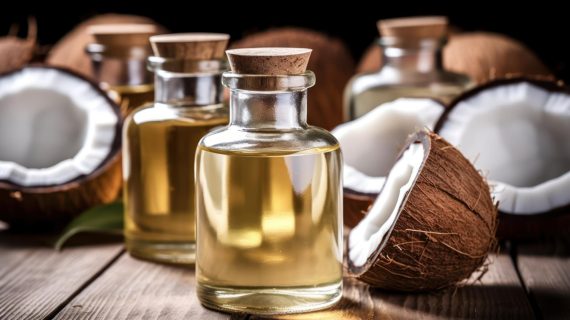- Empty cart.
- Continue Shopping
Coconut Oil vs. Argan Oil: Which is Better for Hair and Skin?
Coconut Oil vs. Argan Oil: Which is Better for Hair and Skin?
Coconut oil and argan oil are two of the most popular natural oils in the beauty world, both known for their ability to nourish, moisturize, and protect hair and skin. While both oils offer impressive benefits, they each have unique properties that make them better suited for different needs. Whether you’re looking to hydrate dry skin, smooth frizzy hair, or add shine, understanding the differences between coconut oil and argan oil will help you choose the best option for your beauty routine.
Coconut Oil: A Multi-Purpose Moisturizer
For Hair:
- Why It Works: Coconut oil is rich in lauric acid, which has a low molecular weight, allowing it to penetrate deeply into the hair shaft. This makes it highly effective for strengthening and moisturizing hair from the inside out.
- How It Helps: Coconut oil is excellent for treating dry, damaged, and frizzy hair. It reduces protein loss, helps repair split ends, and adds shine. Its deeply hydrating properties make it ideal for use as a hair mask or leave-in conditioner.
- Best For: Thick, curly, or frizzy hair types that need extra moisture and repair.
For Skin:
- Why It Works: Coconut oil is a fantastic moisturizer for dry skin due to its high content of fatty acids. It forms a protective barrier on the skin, locking in moisture and preventing water loss.
- How It Helps: Coconut oil soothes dry, flaky skin and can be used as a body moisturizer, makeup remover, or even for oil cleansing. Its antibacterial and anti-inflammatory properties also make it helpful for skin prone to irritation.
- Best For: Dry skin, rough patches, and areas that need deep hydration.
Argan Oil: Liquid Gold for Skin and Hair
For Hair:
- Why It Works: Argan oil, also known as “liquid gold,” is rich in vitamin E, omega-6 fatty acids, and antioxidants. It moisturizes and protects the hair, providing nourishment and shine without feeling greasy.
- How It Helps: Argan oil is lightweight, making it ideal for taming frizz, smoothing split ends, and adding shine to all hair types. Its high vitamin E content strengthens the hair and promotes a healthy scalp, making it perfect for overall hair care.
- Best For: Fine, straight, or wavy hair types that need moisture without added weight. It’s also ideal for reducing frizz and improving shine.
For Skin:
- Why It Works: Argan oil is packed with antioxidants and fatty acids that hydrate and nourish the skin while protecting it from environmental damage.
- How It Helps: Argan oil absorbs quickly, leaving the skin feeling soft and smooth without any greasy residue. It helps improve skin elasticity, reduce the appearance of fine lines, and even out skin tone. Additionally, its lightweight texture makes it suitable for all skin types, including oily and sensitive skin.
- Best For: Normal to oily skin, anti-aging concerns, and those looking for a lightweight moisturizer.
Key Differences Between Coconut Oil and Argan Oil
- Hydration and Moisture:
- Coconut Oil: Provides intense hydration and forms a barrier to lock in moisture, making it ideal for very dry skin and thick, damaged hair.
- Argan Oil: Hydrates and nourishes without being too heavy, making it better suited for normal to oily skin and finer hair types.
- Texture and Absorption:
- Coconut Oil: Thicker in consistency and can take longer to absorb. It’s ideal for overnight treatments or areas needing deep moisture.
- Argan Oil: Lightweight and fast-absorbing, perfect for daily use on hair and skin without leaving a greasy residue.
- Benefits for Hair:
- Coconut Oil: Best for deep conditioning and repairing damaged hair, especially for curly or coarse hair.
- Argan Oil: Great for adding shine, reducing frizz, and protecting hair from heat and environmental damage, particularly for fine or medium hair.
- Skin Type Suitability:
- Coconut Oil: Ideal for dry or flaky skin but can clog pores, so it’s not recommended for acne-prone or oily skin.
- Argan Oil: Suitable for all skin types, including oily and acne-prone skin, as it is non-comedogenic and helps balance oil production.
How to Use Coconut Oil and Argan Oil
For Hair:
- Coconut Oil: Use as a deep conditioning treatment. Apply generously to dry hair and leave it on for at least 30 minutes (or overnight), then shampoo thoroughly to remove the oil.
- Argan Oil: Apply a small amount to damp or dry hair to smooth frizz, add shine, or protect your hair from heat styling. Use it sparingly to avoid buildup.
For Skin:
- Coconut Oil: Apply to dry areas after a shower to lock in moisture, or use it as an oil cleanser for removing makeup.
- Argan Oil: Apply a few drops to your face after cleansing for lightweight hydration, or mix it with your moisturizer for added nourishment.
Conclusion: Coconut Oil vs. Argan Oil – Which Is Better?
Both coconut oil and argan oil offer amazing benefits for hair and skin, but the best choice depends on your specific needs. Coconut oil is better for deep hydration, repairing damaged hair, and moisturizing very dry skin. Argan oil, on the other hand, is ideal for lightweight hydration, taming frizz, and providing anti-aging benefits without clogging pores. By understanding the unique qualities of each oil, you can choose the one that works best for your hair and skin type.
Interested in creating your own product line? Explore our private labeling options and bring your brand vision to life. Fill out our Form to get started.
Discover more about our services by visiting our website.

